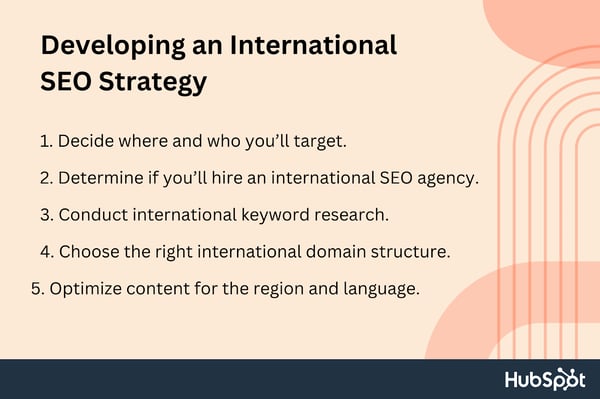Navigating the Digital Landscape: Leveraging International SEO for Cross-Border Success
In today's interconnected electronic globe, companies are progressively looking beyond borders to tap into global markets. The intricacy of browsing the electronic landscape on a global scale demands a nuanced method, from understanding the principles of International Search engine optimization to executing geotargeting and multilingual search phrase approaches.
Understanding International SEO Fundamentals
Navigating the complexities of global SEO calls for a solid understanding of fundamental principles to properly broaden online presence throughout borders. One critical facet of international SEO is comprehending the relevance of localization.
Additionally, having a clear understanding of geo-targeting is necessary. This includes showing to internet search engine the certain nations or areas a website is targeting. Executing hreflang tags is one way to interact this information, making certain that the right version of a webpage appears in the search engine result for a customer in a certain location.
Furthermore, understanding the influence of local online search engine and social media sites platforms is important for worldwide search engine optimization success. While Google is dominant in numerous regions, countries like China have their own search engines like Baidu, calling for tailored strategies for each system to maximize on the internet visibility (International SEO).

Targeting Multilingual Keyword Methods
Establishing multilingual search phrase techniques is necessary for successfully getting to diverse worldwide target markets and making best use of on the internet presence across various linguistic regions. When targeting multilingual keyword phrase strategies, it is vital to conduct extensive research to recognize the specific search terms and expressions utilized by the target market in each etymological region. This includes not just converting keyword phrases yet also thinking about social subtleties, local languages, and search trends special to each target market.
To develop a successful multilingual keyword phrase strategy, it is vital to focus on relevance and search intent. Keywords must line up with the content on the web site and reverberate with the social context of the target market. Utilizing tools such as Google Search Phrase Organizer, SEMrush, or Ahrefs can help determine high-performing keywords in various languages and assess their search volume and competitors level.
In addition, surveillance and analyzing the performance of multilingual key words routinely is necessary for enhancing and fine-tuning the approach with time. By continually adapting to changes in search behavior and patterns, companies can improve their on-line exposure and attract even more international traffic to their internet sites.
Executing Geotargeting and Hreflang Tags
When intending to enhance global SEO strategies, incorporating geotargeting and hreflang tags is vital for enhancing site visibility throughout different areas. Geotargeting involves customizing material to specific areas, making certain that individuals in various areas obtain appropriate information. By applying geotargeting, organizations can boost their regional search rankings and bring in region-specific website traffic.

Optimizing Website Structure for Worldwide Exposure
To additionally boost global SEO strategies beyond geotargeting and hreflang tags, maximizing the web site structure is crucial for accomplishing global presence and making best use of reach throughout various regions. A well-structured internet site not just enhances customer experience however also facilitates search engine spiders in comprehending the web content and context of the site. When going for international visibility, it is crucial to make certain that the web site is organized in a sensible way that provides to individuals from various nations. Carrying out a clear pecking order with distinctive classifications and subcategories can aid in boosting the site's navigating and user-friendliness.
Additionally, creating language-specific subdirectories or subdomains can aid online search engine supply the best variation of the web site to users based upon their language choices, additionally boosting the general user experience. Furthermore, optimizing URL structures to consist of appropriate keyword phrases and geotargeted terms can improve the website's presence in different regions. By structuring the website effectively for international target markets, organizations can raise their possibilities of bring in global website traffic and increasing their reach throughout boundaries.

Surveillance and Assessing Cross-Border Efficiency
Reliable surveillance and studying of cross-border efficiency is essential for reviewing the success of worldwide SEO methods and identifying opportunities for improvement in international reach and exposure. By very closely tracking key efficiency indications (KPIs) throughout various markets, organizations can get useful understandings into the effectiveness of their cross-border search engine optimization initiatives. Monitoring metrics such as organic website traffic, keyword rankings, conversion prices, and bounce rates can offer a thorough view of just how well a website is executing in different areas.
By comparing performance throughout various countries, areas, or languages, business can pinpoint successful strategies and center material to much better provide to details target audiences (International SEO). Normal evaluation of SEO efficiency on a worldwide scale guarantees that companies can adjust news their strategies quickly to exploit on emerging opportunities and preserve a competitive side in global markets.
Conclusion
Finally, worldwide search engine optimization plays a critical function in attaining cross-border success by optimizing company website sites for international visibility, targeting multilingual keyword phrase methods, applying geotargeting and hreflang tags, and checking cross-border efficiency. By understanding the fundamentals of worldwide SEO and maximizing internet site frameworks accordingly, organizations can efficiently get to and involve with their target market throughout different areas and languages. This strategic strategy is crucial for broadening market reach and driving online growth in today's electronic landscape.